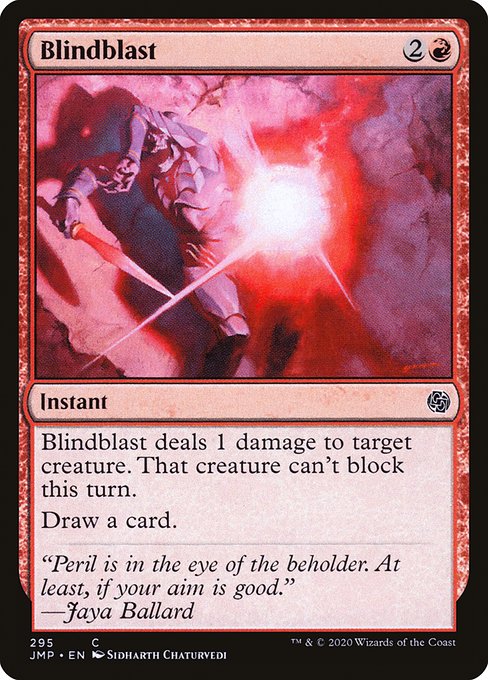
Image courtesy of Scryfall.com
How Embeddings Tie Red Spells Together: A Case Study with Blindblast
In the vast tapestry of Magic: The Gathering, a single card like Blindblast can feel modest at first glance—an instant from Jumpstart priced as a common common sense. But when you zoom out and view the card through the lens of embeddings, you start to see the pattern: a confluence of color identity, mana efficiency, and strategic utility that mirrors many other red instants across the multiverse. This is exactly the kind of signal you want to capture when clustering MTG cards by similarity. 🧙♂️🔥
Blindblast costs {2}{R} for a three-mana commitment and delivers a lean, tempo-friendly line: it deals 1 damage to target creature, that creature can’t block this turn, and you draw a card. It’s a small spell with a punchy effect—perfect fodder for a clustering model that values not just raw numbers but the way a card reshapes combat space. Being part of Jumpstart—an inventive “draft-inspiration” set that blends two packs into a cohesive experience—adds another dimension: the set context, rarity, and the embedded design philosophy of Jumpstart’s reprint culture. And yes, it’s common, which makes Blindblast a staple in builds that emphasize efficiency, repetition, and quick payoff. Flavor text from Jaya Ballard—“Peril is in the eye of the beholder. At least, if your aim is good.”—adds a mischievous wink to the card’s red-hot precision. ⚔️
The embedding mindset: signals that matter on and off the battlefield
When we convert MTG cards into embeddings, we’re not just hashing the text; we’re encoding a tapestry of signals. For Blindblast, the most influential features likely include:
- Color identity and mana cost — Red mana signals aggression, tempo plays, and direct-damage options. Blindblast’s {2}{R} places it in the fast, punchy camp that often seeks to trade resources efficiently.
- Card type and rarity — An Instant with Common rarity tends to be a workhorse in limited and budget decks, which nudges clustering toward other common red instants and cheap answers.
- Oracle text and action verbs — The sequence “deals 1 damage,” “cannot block,” and “draw a card” captures a specific gameplay arc: push damage, deny blocks, replace card draw. Semantics like can’t block a creature this turn are signals for tempo-disruption cards in red.
- Set context and print history — Jumpstart’s design goals influence how cards are perceived as group members: reprints, drafting synergy, and a curated red-black-white balance across a *draft-invention* experience.
- Flavor and art direction — While not a strict numeric feature, the flavor text and Sidharth Chaturvedi’s energetic illustration contribute to a perceptual cluster that fans recognize: red spells with swift, kinetic visuals and a hint of danger. 🧡🎨
From a practical perspective, embedding Blindblast alongside other red instants that deal damage or grant temporary combat phases tends to pull similar cards into neighboring clusters. You might find classmates such as fast burn spells, cheap card filters, or instant-speed board-control tools grouped nearby. The beauty of this approach is that it surfaces both obvious siblings (other red burn spells) and more surprising ones (card-draw enablers or tempo-focused instants) that share underlying structural signals beyond the surface text. The result is a richer map of “red tempo” that helps players discover underutilized synergies and new deckbuilding heuristics. 🧠💥
From data space to deck space: what clustering means in practice
In a practical sense, clustering Blindblast with its peers informs both designers and players. For designers, embeddings help reveal how a card’s signature fits into a broader archetype and whether a card should be encouraged or rebalanced. For players, it provides a mental model: if you cluster a set of red instants with similar costs and effects, you can quickly assemble a cohesive line of play—tempo damage, forced blocks, and draw-based card advantage—without getting bogged down in text minutiae. The Jumpstart context adds another layer: it’s less about optimizing a single deck and more about exploring emergent gameplay loops during a limited run. The card’s flavor and art also offer an emotional anchor—seeing a familiar Jaya-associated line paired with bold red visuals creates a memorable “cluster moment” for fans. 🔥💎
For collectors and historians, this embedding-driven clustering helps identify sets or print runs where particular motifs—such as “low-cost, high-utility red instants” or “tempo-enabling draw spells”—were emphasized. Blindblast stands as a neat example: a common, non-foil instant whose true value emerges when you consider its role in tempo games and your ability to maintain card advantage through a single spell. The collaboration of art, flavor text, and mechanical clarity makes it a recognizable node in a larger red tempo network. 🧙♂️🎲
Eco-Friendly Vegan Leather Mouse PadMore from our network
- https://blog.crypto-articles.xyz/blog/post/nft-data-bagio286-from-bagio-collection-on-magiceden/
- https://crypto-acolytes.xyz/blog/post/nft-stats-it-kids-05057-from-it-kids-collection/
- https://blog.zero-static.xyz/blog/post/mass-effect-legendary-edition-timeline-breakdown-a-deep-dive/
- https://blog.crypto-articles.xyz/blog/post/nft-data-geek-1532-from-geeks-collection-on-magiceden/
- https://crypto-acolytes.xyz/blog/post/nft-stats-labubi-432-from-labubio-collection/

Blindblast
Blindblast deals 1 damage to target creature. That creature can't block this turn.
Draw a card.
ID: 9feaa623-3422-4997-af7b-f75074af5fa1
Oracle ID: 9abeb38c-2243-424c-bfbc-87aa45b6ea4f
Multiverse IDs: 489485
TCGPlayer ID: 216598
Cardmarket ID: 474524
Colors: R
Color Identity: R
Keywords:
Rarity: Common
Released: 2020-07-17
Artist: Sidharth Chaturvedi
Frame: 2015
Border: black
EDHRec Rank: 16299
Set: Jumpstart (jmp)
Collector #: 295
Legalities
- Standard — not_legal
- Future — not_legal
- Historic — legal
- Timeless — legal
- Gladiator — legal
- Pioneer — legal
- Modern — legal
- Legacy — legal
- Pauper — legal
- Vintage — legal
- Penny — not_legal
- Commander — legal
- Oathbreaker — legal
- Standardbrawl — not_legal
- Brawl — legal
- Alchemy — not_legal
- Paupercommander — legal
- Duel — legal
- Oldschool — not_legal
- Premodern — not_legal
- Predh — not_legal
Prices
- USD: 0.09
- EUR: 0.08
More from our network
- https://crypto-acolytes.xyz/blog/post/how-layerzero-enables-cross-chain-dex-connectivity/
- https://blog.crypto-articles.xyz/blog/post/nft-data-flopper-927-from-flopper-collection-on-magiceden/
- https://articles.digital-vault.xyz/blog/post/sandslash-design-evolution-from-base-set-to-scarlet-violet/
- https://blog.crypto-articles.xyz/blog/post/nft-data-nuddies-2080-from-nuddies-collection-on-magiceden/
- https://donation.digital-vault.xyz/donation/post/support-open-source-tools-for-censorship-resilience/
